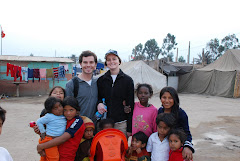
Tonight I performed a ritual; an age old requisite that has been around for more than a hundred years. I brushed my teeth.
I even flossed! And while the latter is more of a rare occurrence, the whole experience (if you can call it that) was somewhat eye-opening given our most recent classroom experience. Today we had a class that is required for our "global health" certificate called major diseases in global health and it was this class that suddenly addressed a new sense of awareness for me about hygiene. You see, this after rising and before laying to rest activity although somewhat subsumed by its general re-occurrence, is actually quite unique. It is unique, as it were, because there are a very numbered amount of people who are not yet "in the know" about the benefits of preserving ones teeth and protecting ones gums.
In other words there are people and children who are "out there" who do not know about brushing their teeth! Now this information had first become available to my consciousness when we traveled to Peru and the people who led the medical campaigns would stand with tribal children and show them the basics of brushing and they would explain to them just why it was so important-this odd and foreign practice of preservation. But for some reason it struck me all over again as we heard our professor lecture about the disparity between those people who do not have 5,000 to 7,000 dollars (the average amount Americans spend on health) to spare on health care and those who do. In our other global health class today we heard that of the 100 billion or so dollars that are spent on healthcare in the United states, 10% of it goes towards pharmaceuticals and plastic surgery. Thousands upon thousands with die of preventable diseases, transmittable and the like, and we will put another couple thousand towards botox.
I'm not talking about the "healthcare debate" here nor am I alluding to a political conundrum, to phrase this realization as a political debate would cheapen it in a major way. More what I am honestly asking is whether or not health is a human right? In a very real way, as I am trying to decide for myself the implications of this question. And though it means very different things in the United States from what it means in Bangladesh, Kenya and Guatemala (although I did hear on the radio this morning that the state of Mississippi currently contains the most impoverished amount of people out of all states in the Union with more than 20% of the population being poor, coincidentally they are also ranked dead last in terms of state healthcare) I am also asking us to observe the potential implications. Again, the implications are tied together with the answer to the question: do we care if others live or die. While it is true that states and cultures place value on human beings' heads, in essence, determining whether humans who are fit to carry on or whether they aren't, we, as the public, human community must answer the question. We have to answer the question because that is what comes with the territory of being alive during a time where someone, some place else is in the midst of dying.
What I am saying is that we cannot allow for 100 billion dollars of healthcare resources and funds to go to plastic surgery and superfluous pharmaceuticals. What I'm saying is that we cannot afford a lukewarm position on this one.What I am saying is that we cannot choose to halfway advocate life or death for others who are in a totally preventable state of dying, we cannot choose clean water for the poor without choosing education. . .even if that education is concerned with brushing ones teeth.
Answer the Question.


